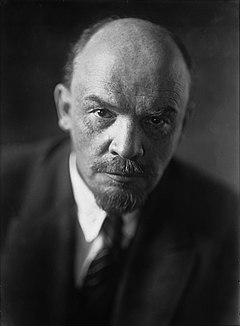Vladimir Lenin
líder fundador da União Soviética de 1922 a 1924
(Redirecionado de Vladimir Ilyich Lenin)
Vladimir Ilyich Lenin (russo: Владимир Ильич Ленин), nome original: Vladimir Ilyich Ulyanov (russo: Владимир Ильич Ульянов) (Simbirsk/Ulyanovsk, 10 de abril/22 de abril de 1870 - Gorki, 21 de janeiro de 1924); foi um revolucionário russo. Responsável em grande parte pela execução da Revolução Russa de 1917, líder do Partido Comunista, e primeiro presidente do Conselho dos Comissários do Povo da União Soviética. Influenciou teoricamente os partidos comunistas de todo o mundo. Suas contribuições resultaram na criação de uma corrente teórica denominada Leninismo.
| Vladimir Lenin | |
|---|---|
| Ленин в 1920 году | |
| Nascimento | Владимир Ильич Ульянов 22 de abril de 1870 Ulianovsk (Império Russo) |
| Morte | 21 de janeiro de 1924 (53 anos) Bolshiye Gorki (União Soviética) |
| Residência | Podolsk, São Petersburgo, Moscovo, Shushenskoye, Schwabing, Londres |
| Cidadania | União Soviética |
| Estatura | 165 cm |
| Ocupação | político, revolucionário |
| Assinatura | |

| |
- "Os capitalistas chamam 'liberdade' a dos ricos de enriquecer e a dos operários para morrer de fome. Os capitalistas chamam liberdade de imprensa a compra dela pelos ricos, servindo-se da riqueza para fabricar e falsificar a opinião pública."
- - The capitalists have always used the term "freedom" to mean freedom for the rich to get richer and for the workers to starve to death. In capitalist usage, freedom of the press means freedom of the rich to bribe the press, freedom to use their wealth to shape and fabricate so-called public opinion.
- - Democracy and Revolution - Página 139, Vladimir Ilʹich Lenin - Resistance Books, 2000, ISBN 1876646004, 9781876646004 - 222 páginas
- - The capitalists have always used the term "freedom" to mean freedom for the rich to get richer and for the workers to starve to death. In capitalist usage, freedom of the press means freedom of the rich to bribe the press, freedom to use their wealth to shape and fabricate so-called public opinion.
- "...a existência da República Soviética lado a lado com os estados imperialistas por um longo tempo é impensável. Um ou outro deve triunfar no final. E antes disso, uma série de aterradoras colisões entre a República Soviética e os Estados burgueses será inevitável."
- - ...the existence of the Soviet Republic side by side with imperialist states for a long time is unthinkable. One or the other must triumph in the end. And before that end supervenes, a series of frightful collisions between the Soviet Republic and the bourgeois states will be inevitable.
- - Report of the Central Committee of the Russian Communist Party (Bolsheviks) at the Eighth Party Congress, Selected Works, Nova York, Vol. 8, p. 33. Também no capitulo Lenin And Stalin’s Policy Of Peaceful Coexistence [1]
- - ...the existence of the Soviet Republic side by side with imperialist states for a long time is unthinkable. One or the other must triumph in the end. And before that end supervenes, a series of frightful collisions between the Soviet Republic and the bourgeois states will be inevitable.
- "A Rússia Soviética considera seu maior orgulho ajudar os trabalhadores de todo o mundo em sua difícil luta pela derrubada do capitalismo".
- - Soviet Russia considers it her greatest pride to help the workers of the whole world in their difficult struggle for the overthrow of capitalism.
- - No Quarto Congresso Mundial do Comintern e o Soviete de Petrogrado dos Trabalhadores e Deputados do Exército Vermelho (Fourth World Congress of the Comintern and the Petrograd Soviet of Workers and Red Army Deputies), Selected Works, quarta ed. russa, Vol. 33, p 379. Também no capitulo Lenin And Stalin’s Policy Of Peaceful Coexistence [2]
- - Soviet Russia considers it her greatest pride to help the workers of the whole world in their difficult struggle for the overthrow of capitalism.
Sobre
editar- “Não tenho razão alguma para supor que Lenin tirou suas ideias de meus livros; mas se isso for verdade, eu não deveria ter o menor orgulho por ter contribuído para o desenvolvimento intelectual de um homem que me parece ser ao mesmo tempo o maior teórico do socialismo desde Marx e um estadista cujo gênio lembra o de Pedro, o Grande”.
- - Georges Sorel cf. “For Lenin”, Soviet Russia, Official Organ of The Russian Soviet Government Bureau, Vol. II, New York: NY, January-June 1920 (April 10, 1920), p. 356.
- “Lenin talvez esteja orgulhoso do que seus camaradas estão fazendo; os trabalhadores russos estão adquirindo glória imortal na tentativa de realizar o que era até então apenas uma ideia abstrata”.
- - Georges Sorel cf. “For Lenin”, Soviet Russia, Official Organ of The Russian Soviet Government Bureau, Vol. II, New York: NY, January-June 1920 (April 10, 1920), p. 356.
- “Mussolini não era só mais um socialista; ele era o Lenin da Itália — o líder da facção revolucionária radical. E Mussolini não era só um "jornalista"; ele era o editor do Avanti!, o jornal oficial do Partido Socialista.”
- - Mussolini wasn’t just another socialist; he was the Lenin of Italy – the leader of the hard-line revolutionary faction. And Mussolini wasn’t just a “newspaperman”; he was the editor of Avanti!, the official newspaper of the Socialist Party.
- - Bryan Caplan, The Pageant of World History vs. Wikipedia: The Case of Mussolini — 20 de junho de 2012.
- “Lenin criou Stalin”.
- - Victor Sebestyen, historiador da Rússia e do comunismo
- - Fonte: UOL — 17 de junho de 2020
Atribuídas
editar- "Sem teoria revolucionária, não há prática revolucionária."
- - без революционной теории нет революционной практики.
- - За коммунистическое воспитание, Edições 1-21, Работник просвещения, 1931, p. 57.
- - без революционной теории нет революционной практики.
